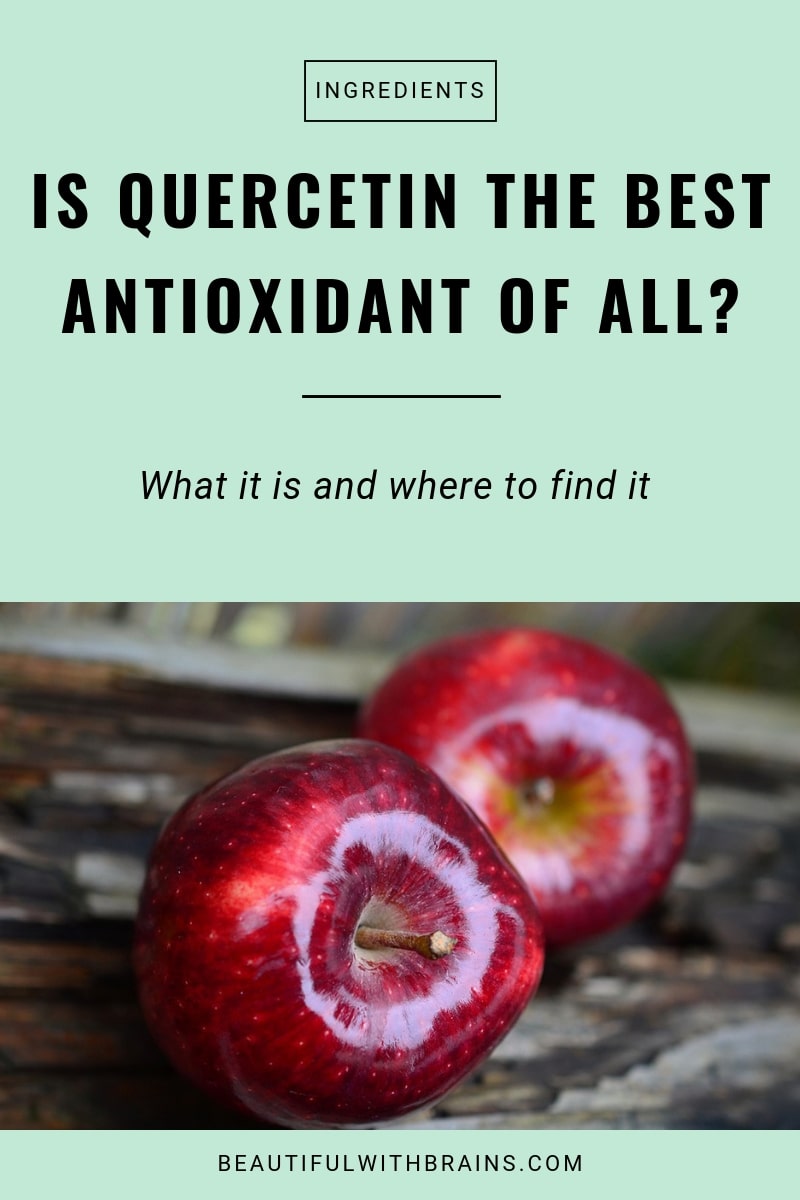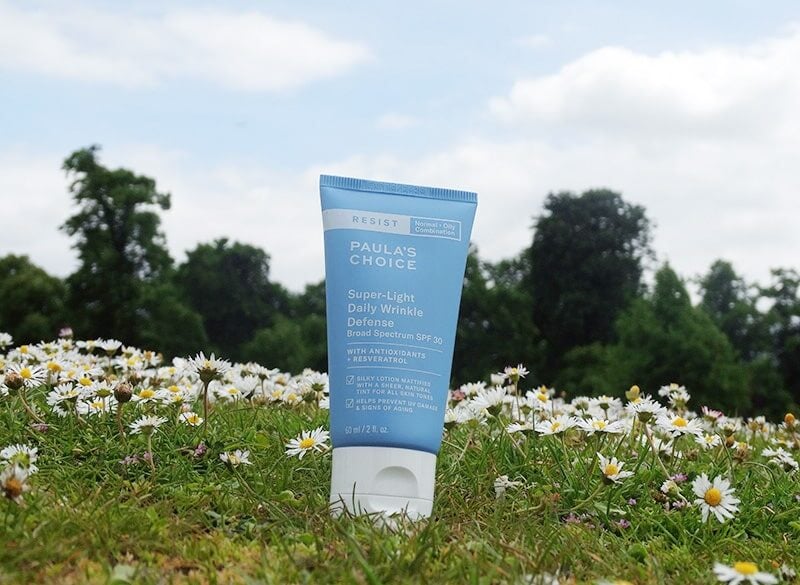
Every skincare brand has its antioxidant darling.
Caudalie has resveratrol (from grapes). Nivea has co-enzyme Q10. Korres has quercetin.
Literally no one had heard of quercetin before Korres proudly showed off its name on all its skincare products. Now, it’s on everyone’s lips.
Rumour has it, it can reduce wrinkles and make your skin firmer and more elastic. Can it deliver? Here’s what science says:
What Is Quercetin?
Quercetin is a member of the flavonoid family, a group of antioxidants with soothing properties.
Flavonoids are the pigments that give fruits and vegs their beautiful rich colours. You’ll find quercetin in apples, tea, olive oil, leafy vegs like cabbage and spinach, citrus fruits, red wine and grapes – to name just a few!
How Does Quercetin Benefit Your Skin?
Quercetin is a flavonoid, so it has powerful antioxidant and anti-inflammatory properties.
Like all antioxidants, it patrols your body looking for free radicals (the nasty molecules that give you wrinkles and dark spots). When it spots one, it goes on the attack and neutralises it before it can wreak its aging damage.
Plus, it soothes inflammation, another of the main causes of premature aging. But it soothing properties do more than keeping wrinkles at bay for longer. Quercetin also helps with eczema.
But, let’s be clear: fighting free radicals and soothing inflammation help PREVENT, not treat, wrinkles and dark spots. Don’t believe brands that tell you otherwise.
One more thing: Quercetin is a powerful antioxidant, but it’s not the best. There is no best. Just like your body needs more than just kale, your skin needs more than one antioxidant to stay healthy and strong.
By all means, add it to your skincare routine. Just don’t rely only on it. The more antioxidants you use, the better.
Related: The Most Common Antioxidants In Skincare
Need help creating an anti-aging routine that really works? Sign up to the newsletter below to receive the “Anti-Aging Skincare Routine Cheatsheet” (it includes product recommendations, too!).
Can Quercetin Fade Away Dark Spots?
Scientists are always looking for innovative ways to treat dark spots. Because the treatment available now either don’t work for everyone or are harsh and irritating. Some may even make your skin blue (I’m talking to you, Hydroquinone).
Polyphenols have powerful anti-aging properties, so researchers are wondering if quercertin can go the extra mile and fade away dark spots, too.
Unfortunately, it doesn’t. A 2016 study concluded that “quercetin itself is shown to be ineffective for hypopigmentation of human skin”. Bummer!
Related: Battle Of The Skin-Lightener: Which Is The Best Alternative To Hydroquinone?
What Else Does Quercetin Do In Skincare Products?
This is not as exciting as preventing wrinkles (unless you’re a skincare nerd), but it’s worth mentioning, too.
A 2010 study show that Quercetin can slow down the degradation of unstable UV filters Avobenzone and Octinoxate – and it does it better than common stabilizers Octocrylene and vitamin E!
Why this matters? The faster these UV filters degrade, the sooner the sun protection of your sunscreen expires. Used alone, Avobenzone is effective for less than 2 hours!
You don’t want to reapply sunscreen every 30 minutes. Adding stabilisers like Quercetin helps your sun protection last a little bit longer.
Related: Do You Really Need To Reapply Sunscreen Every Two Hours?

What Are The Best Skincare Products With Quercetin?
Korres may have made quercetin famous, but my fave skincare products with this antioxidant come from other brands (sorry, Korres!):
- Dr Dennis Gross Ferulic Acid + Retinol Brightening Solution ($88.00): Available at Dermstore, Nordstrom, Sephora and SpaceNK
- Elta MD UV Physical SPF 41 ($30.00): Available at Dermstore and Walmart
- Paula’s Choice Resist Ultra-Light Super Antioxidant Concentrate Serum ($39.00): Available at Dermstore, Feel Unique, and Paula’s Choice
Does Quercetin Have Any Side Effects?
Quercetin is safe for skin. Everyone can use it (unless you’re allergic to it, obvs). But, it shows minor cytotoxicity (the quality of being toxic to a cell).
Translation: it’s safe in the small concentrations used in skincare. But you probably wouldn’t want to use a serum with 20% Quercetin (not that I’ve ever seen one). More isn’t always better in skincare.
The Bottom Line
Quercetin isn’t the miracle worker Korres claims it is (surprise, surprise!) but it can help you keep wrinkles at bay. I’m a fan.
Have you ever used products with Quercetin? Share your experience in the comments below.


I used the Korres quercetin primer before and it was very nice. Once in a while, people would promote a new ingredient that would do more or less of the same with the ones we already knew just to sell products. I hope quercetin works on skin, although taking orally is not a bad option, either.
Dao, I’m glad to hear the Korres primer is good. That’s so true and it really bugs me. I got nothing against Quercetin but it really annoys that it’s touted as the next best antioxidant ingredient when we don’t even know how it works topically just to sell more. There’s nothing wrong with using skincare products with Quercetin but for now, I prefer taking it orally. 🙂
I’ve used the Quercetin primer and liked it too! I did notice that the active ingredient was toward the end of the list, which leads to believe there isn’t much in there and could possibly just be marketing mumbo jumbo. Taking supplements orally does seem to be more effective than applying things topically – I think that goes for any type of ingredients.
Tammy, I’m glad you like it but what a shame Quercetin is so low in the list. Doesn’t really matter whether it works topically or not then as the amount will be too small to be effective anyway. And I agree with you that taking any ingredient orally is definitely more beneficial than applying them on the skin. But with antioxidants like Vitamins A and C (provided there is enough of them in the product and in stable form too) you know they are effective topically so I like to apply them on the skin as well as eating foods rich in them to get the most possible benefits. But with Quercetin, I’d rather just eat it for now. 🙂
Thanks for this post 🙂 I’ll definitely keep that in mind next time I hear about this ingredient.
Makeup Morsels, you’re welcome. 😉
I was wondering about it when I heard the Korres quercetin line, thanks for posting this! 😉 x
Stavroula, you’re welcome. I’m glad you found it useful. 🙂
Thanks for this post, gio!
I am still waiting to get my hands on the Korres Quercetin primer, etc. I tried a sample of its day cream with SPF12, but the sample lasted me only about 5 application, so can’t tell if it works or not.
Vonvon, you’re welcome. I have to say I am very tempted to try the primer too afte reading all your comments. I’m sure it works well but I highly doubt that’s because of Quercetin.
I actually use the Korres night cream. I’d read reviews on it and it was equal in cost to my previous cream so I though I would give it a go
It does soften the skin nicely – it does not reduce wrinkles, but my skin does look great. The only thing I dislike about it is that it smells like playdoh. As to whether I’ll keep using it…well, it’s effects aren’t so fantastic that I’m bowled over. I may try something new to see if there’s a better product. I read great things about l’occitane.
Anita, thanks for your comment and sharing your experience with the Korres cream. Sounds just like a basic moisturizer then.
Quercetin is yellow so putting it in a skin cream at concentration larger than several % would be problematic.
Sammy, that’s true. But there’s no point in putting too little of it either.